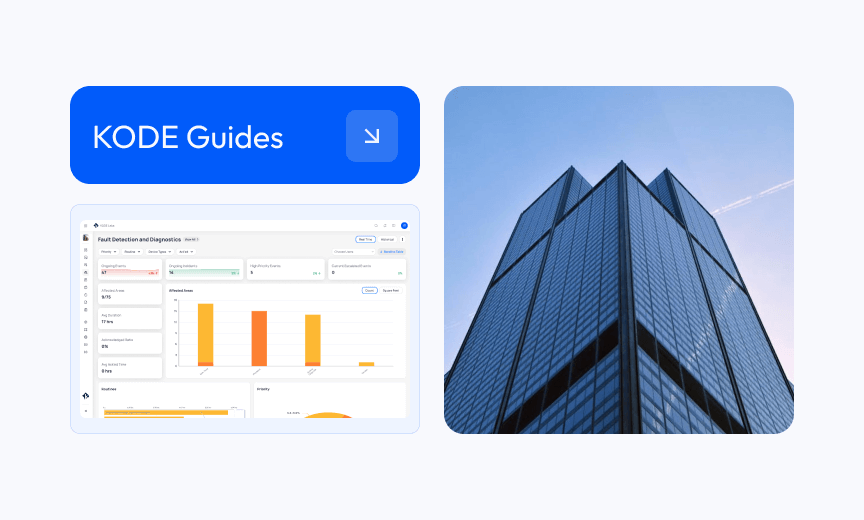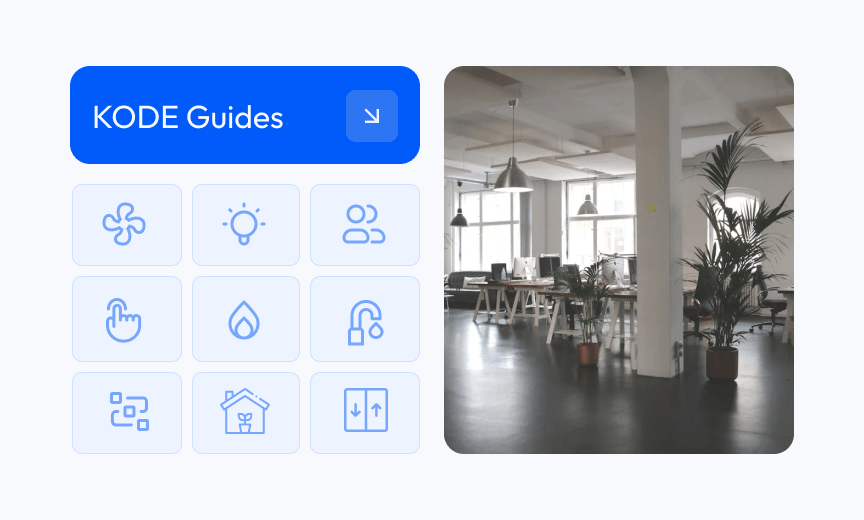By KODE Team
On this page
Sign up to our newsletter
Subscribe to receive the latest blog posts to your inbox every week.
By subscribing you agree to with our Privacy Policy.
How KODE can help you achieve LEED certification

LEED Certification Introduction
The LEED (Leadership in Energy and Environmental Design) rating system is the most widely used green building rating system worldwide. KODE OS can facilitate LEED certification efforts across 6 of the 8 LEED scoring categories. The LEED categories that are facilitated by KODE OS are highlighted in this document. In addition to supporting LEED certifications, KODE OS also provides the building with faster and easier integration capabilities to demand response API’s from utility companies.
LEED Minimum Program Requirements
All projects applying for LEED certification must meet a set of minimum program requirements (MPRs) to determine project eligibility for LEED. Minimum program requirements define the types of buildings that LEED was designed to evaluate.
MPR #1: Must be in a permanent location on existing land
All LEED projects must be constructed and operated on a permanent location on existing land. This requirement applies to all land within the LEED project.
MPR #2: Must use reasonable LEED boundaries
The LEED project boundary encompasses all land associated with the project, including areas altered during construction and those primarily used by project occupants, such as parking lots, sidewalks, and landscaping.
MPR #3: Must comply with project size requirements
All LEED projects must meet the size requirements listed for their respective LEED rating system. Refer to LEED minimum program requirements | U.S. Green Building Council for detailed information.
Meet LEED v4 certification requirements with KODE
LEED v4 for BD+C: New Construction and Major Renovation
Location & Transportation (LT)
Location and Transportation (LT) Category The Location and Transportation (LT) category focuses on sustainable building practices related to location and transportation decisions.
KODE Benefits:

Biking Infrastructure:
KODE Labs’ platform can identify the availability and condition of biking infrastructure such as bike racks and secure bike storage areas so long as sensors are installed. This information can be used to promote cycling as a sustainable transportation option.

Monitoring & Reporting:
KODE Labs’ platform can integrate and track transportation-related data, including the number of carpoolers, EV charging station usage, and public transit ridership. This data is essential for documenting compliance with LT credits.

Electric Vehicle (EV) Charging:
KODE Labs can integrate and visualize status of EV chargers, helping occupants find available EV chargers. This encourages the adoption of electric vehicles among building occupants.
Water Efficiency (WE)
The Water Efficiency (WE) category holistically looks at three major components: indoor water (used by fixtures, appliances, and processes, such as cooling), irrigation water, and water metering. Several kinds of documentation span these components, depending on the project’s specific water-saving strategies.
KODE Benefits:

Data Monitoring & Infrastructure:
KODE can monitor water usage within a building, including fixtures, irrigation systems, and other water-consuming equipment. This data can be used to identify areas of excessive water use and opportunities for conservation.

Reporting & Analytics:
Building owners can use KODE Labs’ data analytics and reporting tools to track water consumption over time, identify trends, and make informed decisions about water-saving strategies.

User Education:
KODE Labs’ products can provide real-time feedback and analysis to building occupants about their water usage, encouraging responsible water use practices.

Integration with Water-Saving Fixtures:
KODE Labs’ products can provide real-time feedback and analysis to building occupants about their water usage, encouraging responsible water use practices.

Leak Detection:
KODE Labs can incorporate leak detection sensors and algorithms. Early detection of leaks can prevent water wastage and property damage, contributing to water efficiency goals.
Energy & Atmosphere (EA)
The Energy and Atmosphere (EA) category aims to enhance energy efficiency, reduce greenhouse gas emissions, and promote sustainable energy practices in the built environment.
KODE Benefits:

Energy Optimizations: EO utilize machine learning to optimize the start and stop times of building systems, such as HVAC, based on factors like temperature, weather, historical performance, and more. By ensuring that systems are only running when necessary, building owners can significantly reduce energy consumption while maintaining occupant comfort.

Fault Detection & Diagnostics (FDD): FDD aggregates events and alarms to identify the root causes of building system equipment issues. Detecting and addressing system faults promptly can lead to improved system efficiency and energy savings. It can also help prevent unnecessary energy consumption due to malfunctioning equipment.

Energy Insights: KODE Labs’ data modeling and Building BI – Insights tools provide comprehensive energy data analysis and visualization. Building owners can track energy usage, identify areas of inefficiency, and make data-driven decisions to optimize energy consumption and reduce costs.

Energy Monitoring and Efficiency: KODE’s platform can integrate with all energy meters and utility companies to report, analyze and orchestrate information. This helps drive energy usage down while saving runtime hours on the different building systems.

Digital Commissioning: Digital Cx conducts automated tests to ensure the functionality of building equipment. By regularly testing and optimizing HVAC systems and other equipment, building owners can maintain peak efficiency and reduce energy waste.

Internet of Things (IoT) Platform: KODE Labs’ IoT platform allows building owners to collect data from various sensors, including those related to occupancy and temperature. This data can be used for real-time monitoring and control of building systems, helping to ensure that energy is used efficiently based on occupancy and environmental conditions.

Data Sharing and Reporting: KODE Labs’ data management tools enable building owners to collect, normalize, and share data with third-party platforms. This can facilitate the automated reporting of energy usage and sustainability metrics required for LEED.
Indoor Environmental Quality (EQ)
The EQ (Indoor Environmental Quality) category emphasizes creating indoor environments within green buildings that prioritize the health, comfort, and well-being of occupants. It addresses factors like air quality, thermal comfort, lighting quality, and acoustic design to enhance productivity, reduce absenteeism, and improve overall occupant satisfaction.
KODE Benefits:

Indoor Air Quality (IAQ) Monitoring: KODE can monitor indoor air quality parameters such as temperature, humidity, CO2 levels, and VOCs (volatile organic compounds). This data can help building owners ensure that the indoor environment meets IAQ standards.

HVAC Optimization: KODE Labs can optimize HVAC (Heating, Ventilation, and Air Conditioning) systems for energy efficiency while maintaining indoor comfort. Properly functioning HVAC systems contribute to thermal comfort and air quality.

Real-time Alerts: KODE Labs’ products can provide real-time alerts for issues such as temperature fluctuations, humidity imbalances, or IAQ concerns, allowing building owners to take prompt corrective action.

Occupancy Monitoring: KODE Labs’ solutions may include occupancy sensors that help optimize lighting, ventilation, and temperature settings based on real-time occupancy patterns, enhancing comfort and energy efficiency.

Lighting Quality: KODE Labs’ systems can monitor lighting conditions, including natural daylight and artificial lighting levels. This ensures that spaces are adequately lit, reducing eye strain and improving visual comfort.

Acoustic Comfort: Some KODE Labs products may integrate with acoustic sensors to monitor noise levels. This information can be used to identify areas with acoustic discomfort and implement sound-reducing measures.
Innovation (IN)
The IN (Innovation) category within LEED focuses on recognizing and rewarding projects for implementing innovative building features and sustainable practices, while also promoting cohesive teamwork and collaboration among project professionals.
KODE Benefits:

Indoor Air Quality (IAQ) Monitoring: KODE can monitor indoor air quality parameters such as temperature, humidity, CO2 levels, and VOCs (volatile organic compounds). This data can help building owners ensure that the indoor environment meets IAQ standards.

HVAC Optimization: KODE Labs can optimize HVAC (Heating, Ventilation, and Air Conditioning) systems for energy efficiency while maintaining indoor comfort. Properly functioning HVAC systems contribute to thermal comfort and air quality.

Real-time Alerts: KODE Labs’ products can provide real-time alerts for issues such as temperature fluctuations, humidity imbalances, or IAQ concerns, allowing building owners to take prompt corrective action.

Occupancy Monitoring: KODE Labs’ solutions may include occupancy sensors that help optimize lighting, ventilation, and temperature settings based on real-time occupancy patterns, enhancing comfort and energy efficiency.

Waste Reduction & Management: KODE Labs can assist in tracking waste generation and management practices for existing buildings. This includes monitoring recycling rates, reducing waste sent to landfills, and promoting composting and waste reduction programs.
Regional Priority (RP)
The RP (Regional Priority) overview in LEED emphasizes the importance of addressing locale-specific environmental priorities by identifying and prioritizing credits that align with regional environmental concerns and aims to enhance the environmental impact of LEED projects within specific locales.
KODE Benefits:

Local Environmental Data Integration:
KODE Labs’ solutions can integrate with local environmental data sources, such as weather data, air quality monitoring, and utility data specific to the project’s location. This integration helps building owners gather relevant data required for RP credits related to local environmental concerns.

Customized Monitoring:
Building owners can use KODE Labs’ platform to set up customized monitoring for local environmental priorities. For example, if water conservation is a regional concern, KODE Labs’ tools can help track and report water usage, aiding in meeting RP credits related to water efficiency.




